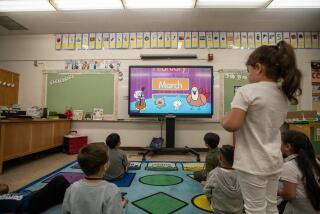Moms and Dads Want to Do This Homework
On the first day of the year at her Watts elementary school, first-grade teacher Kate Sobel shares with parents her goal that their children will read a chapter book by year’s end. Soon after, she has frank conversations on the academic achievement gap and how the odds are stacked against their children. Then, with the guidance of Sobel’s workshops, the parents join with her to work toward the goal.
Sobel’s story demonstrates a pattern among highly successful teachers in low-income communities. These teachers enlist the support of families. They realize that “parental involvement” must be about more than behavior.
Highly effective teachers establish ambitious goals and invest their students in working toward those goals. In low-performing schools, successful teachers know that perhaps their most important step is to get students to believe that hard work will lead to academic success. Too often, students’ experiences have led them to believe they are doomed to failure.
Families are a key to changing that devastating mind-set. Research shows the messages that parents send regarding whether intelligence is fixed -- something you either have or don’t -- or malleable may be their most important role in influencing students’ achievement. Involving parents, then, in the notion that their children’s hard work will lead to success is crucial.
Helen McClaugherty, who teaches children of migrant families in southern Texas, proposed telling parents about research showing the benefits that come to children who read for 30 minutes, three days a week. Initially, her principal resisted, worrying about putting additional pressure on families, many of whom live without electricity. Helen persisted and found parents got excited that their children could, with so little effort, put themselves in the ranks of the nation’s most prolific readers. Weeks later, far from complaining about increased homework expectations, parents were calling the principal to praise the changes in their children’s literacy.
Investing parents in ambitious academic goals can be a massive undertaking. Parents in low-income communities tend to have less academic experience themselves and fewer resources they can call on to ensure their children are getting what they need. As a result, they can feel intimidated, alienated or ineffectual in interactions with the school. Successful teachers recognize these potential challenges and see it as their role to break down the separation that families might feel from school.
Again and again I hear teachers working in our nation’s most underserved communities make the same point: With few exceptions, parents want what’s best for their children and are eager to do their part, given the guidance and opportunity. Rather than buying into the destructive myth that parents just don’t care, teachers must be leaders who recognize the power of parents to fuel the journey toward ambitious academic goals.
Sobel puts it this way: “In the same way kids read and live up to the expectations we have for them, I find that parents do too.” With all of Sobel’s first-graders reading a chapter book at the end of the year, we would do well to listen.
More to Read
Sign up for Essential California
The most important California stories and recommendations in your inbox every morning.
You may occasionally receive promotional content from the Los Angeles Times.










